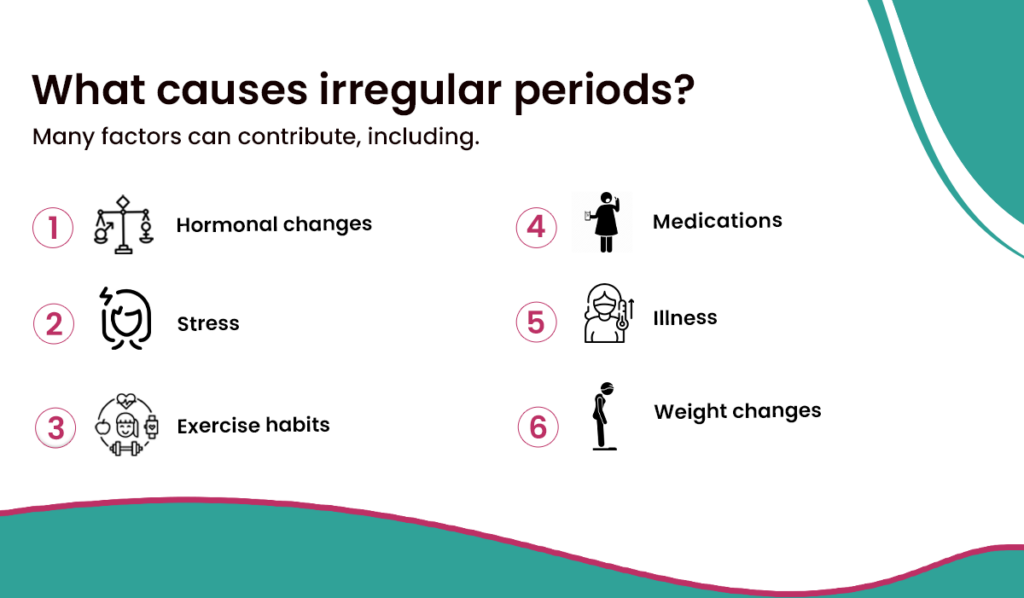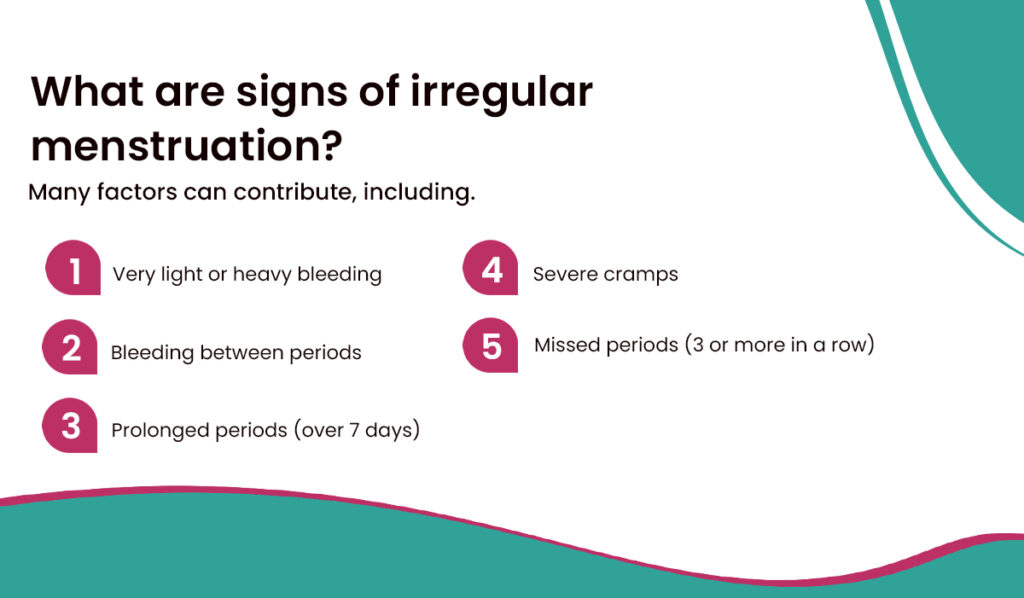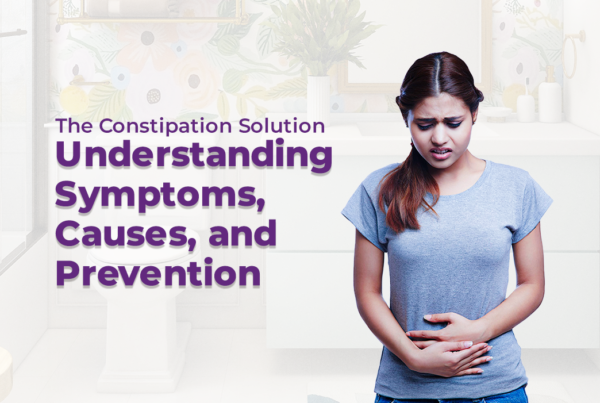
Generally, the duration of a menstrual cycle is around 28 days. Nevertheless, there exists a broad spectrum of what is seen as “normal” in reference to the menstrual cycle. Therefore, there is no need for concern if your menstrual cycle consistently exceeds or falls short by a few days.
However, irregular menstruation, characterized by the consistent occurrence of your menstrual cycle at unexpected intervals, may indicate an underlying physiological imbalance. Irregular menstrual cycles may serve as an early indicator of probable fertility issues.
Gaining the knowledge to identify abnormal menstrual cycles can enhance your comprehension of your own physiology. Consistent menstrual cycles maintain a consistent duration from one month to another.
An irregular cycle is characterized by variations in its duration, such as transitioning from a 28-day length to 31 days and then to 25 days. It may deviate from the average length, either being shorter or longer. You may experience either absence of blood or severe bleeding.
Frequently, the phrase “irregular” may refer to a deviation from the usual pattern or behavior that is typical for an individual.
Acquire more knowledge on irregular menstrual cycles and the appropriate time to seek consultation with an obstetrician/gynecologist.
What causes irregular menstruation?
Determining the regularity or irregularity of your menstrual cycles may be achieved by documenting the duration of each cycle. To ascertain the duration of your menstrual cycle, just begin counting from the first day of your period till the first day of your next period.
Day 1 is typically considered the first day of real flow. Cycles lasting between 21 and 35 days are considered typical.
According to the American College of Obstetricians and Gynecologists (ACOG), your period is irregular if it tends to come more frequently than every 21 days or less often than every 35 days.
If your menstrual cycle duration is within the normal range but exhibits a fluctuation of seven to nine days between cycles, this indicates an irregular menstrual period as well.
Causes for Irregular Periods:
Several causes may impact your menstrual cycle and result in occasional irregular periods, such as a shift in your cycle length from 28 to 31 days.
Severe stress, sickness, rigorous physical activity, or a significant journey, particularly if it disrupts your sleep schedule, might modify your menstrual cycle, resulting in missed periods or spotting. Nevertheless, if your menstrual cycle returns to its usual pattern in the next month, Occasional irregularity is improbable to be a source of worry.
You can also have an abnormal cycle or bleeding if you are breastfeeding, pregnant, or having a miscarriage.
Significant changes in your exercise habits or body weight might also impact your menstrual cycle.
Excessive physical activity and quick reduction in body weight might result in irregular or even absent menstrual cycles.
What causes irregular periods?
Many factors can contribute, including:
- Hormone imbalances
- Stress
- Illness
- Weight changes
- Exercise habits
- Medications
- Medical conditions (e.g., thyroid problems, PCOS)

What are signs of irregular menstruation?
Besides timing variations, consider:
- Very light or heavy bleeding
- Bleeding between periods
- Prolonged periods (over 7 days)
- Severe cramps
- Missed periods (3 or more in a row)

The 28-Day Myth
There is a prevalent assumption that the duration of a menstrual cycle should be 28 days. You may assume this information from the posters and booklets you saw in your health class or from the design of the birth control package.
Indeed, 28 days serves as a general approximation for the typical duration of individuals’ menstrual cycles. Analysis of data obtained from a menstrual cycle monitoring application revealed that the mean duration of a cycle is in fact somewhat extended, measuring 29.3 days.
Other Period Irregularities:
Deviation from the average cycle length is not the only indicator of irregular menstruation. It is crucial to be attentive to other indicators that may suggest an imbalance in your well-being or hormonal levels.
Minimal Bleeding
Experiencing little or no bleeding (referred to as amenorrhea) throughout each menstrual cycle is considered unusual. Severe underweight or extreme overweight may lead to little or absent bleeding.
If you are overweight, losing weight might help make your periods more regular. If you are underweight, gaining weight can help restore and regulate your menstrual cycle. (Slow and steady weight change is the healthiest way to get there.)
Mid-Cycle Spotting
Spotting between periods is often attributed to hormonal fluctuations. Birth control prescription, fertility medicines, or a thyroid disease may have an impact on your hormonal balance. The presence of fibroids and polyps in your reproductive tract might also result in recurring episodes of spotting.
Excessive or Prolonged Bleeding
Menorrhagia, often known as excessive bleeding, is a prevalent issue that affects around one-third of those who menstruate.
Despite its prevalence, it is advisable to see a gynecologist to address the issue, even if you have adapted to living with it. Menorrhagia may indicate reproductive problems or medical conditions such as fibroids, polyps, or endometriosis.
Severe Cramps
It is important not to ignore severe menstrual discomfort, sometimes referred to as dysmenorrhea. Possible factors that may impact both your fertility and general well-being include conditions such as fibroids, endometriosis, or pelvic inflammatory disease (an infection in your reproductive organs).
FAQS: Frequently Ask Question on What is an Irregular Period?
Q1. What is an irregular period?
- A period that deviates from your usual pattern, either in timing, duration, or flow.
- Cycles less than 21 days or longer than 35 days, or fluctuating more than 7-9 days between cycles are typically considered irregular.
Q2. Is a 28-day cycle the only “normal” cycle?
No, 28 days is just an average. Cycles typically range from 21-35 days.
Q3. Should I be concerned about occasional irregularity?
Not necessarily. Occasional changes due to stress, illness, travel, etc. are usually temporary.
Q4. When should I be concerned about irregular periods?
If your periods are consistently irregular, especially with other symptoms like heavy bleeding, severe cramps, or missed periods.
Q5. Can irregular periods affect fertility?
Yes, irregular cycles can sometimes make it harder to conceive.
Remember: This information is intended for general knowledge and does not substitute for professional medical advice. Always consult a healthcare provider for personalized recommendations.
References:






